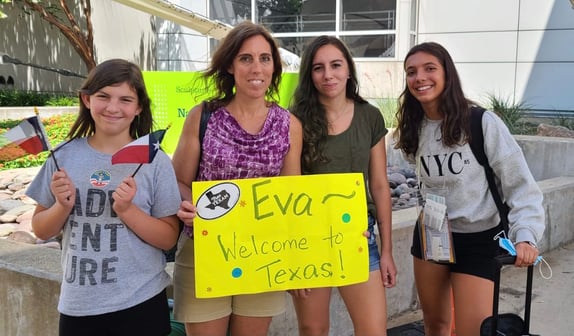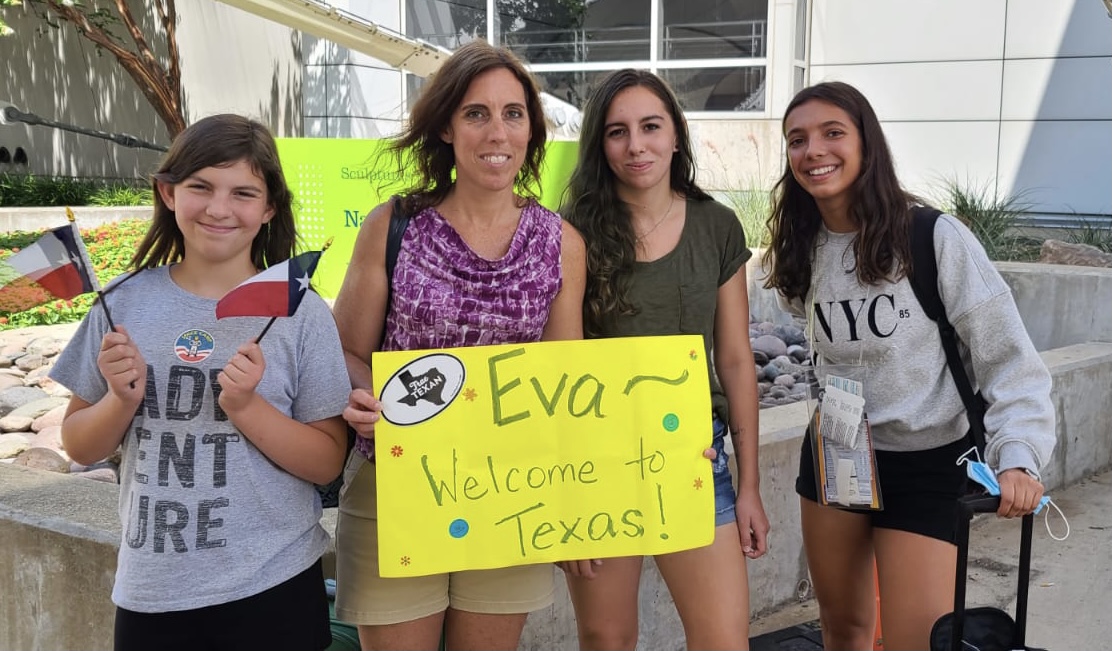Do you dream of visiting Spain one day? Hosting an exchange student from this warm, fun-loving Mediterranean country could be a wonderful experience for your family. But first, read this.
Every year thousands of young students from Spain pack their bags to head for the USA. They are so close with their Spanish family and friends, it’s hard to say goodbye. But they can’t wait to make new friends - and family - in the USA!

Mario (far right) made many friends during a very successful year blending in to his American host family and attending the local high school.
Your family could be a good candidate for hosting a student from this extremely family-oriented culture, but there are a few things you should know before making the leap:
- How does Spanish culture shape these kids?
- What are the benefits for your family?
- What do kids from Spain love doing in the USA?
- Is your family a good fit with a student from Spain?
- How can you host a Spanish student happily ever after?
Spanish exchange students María, Eva, and Mario contributed ideas and pictures for this post. Thank you to all three of you for sharing your valuable experience.
ICES regional and national staff also pitched in. Every year they receive hundreds of kids from Spain. Thanks to them, this guide will help you host a Spaniard happily forever after!
Spanish Culture 101 for Host Families
Spanish teenagers come equipped with some serious bonding capabilities. And you can really enjoy hosting them - if you know what makes them tick. The key is to activate their culturally built-in bonding system, and that’s what this host family version of Spanish Culture 101 is all about...
The Spanish Family
Family is everything in Spain. You might be surprised to learn that most Spanish teenagers actually enjoy regular family time and meals together. Weekends are often reserved for eating long, leisurely meals with extended family (grandparents, aunts, uncles, cousins).
 American families that like doing things together find it very easy to incorporate a family-oriented exchange student from Spain.
American families that like doing things together find it very easy to incorporate a family-oriented exchange student from Spain.
This is good news for American host families looking for family-oriented exchange students. Expect your Spanish teenager to sign up for family meals, trips and even simple things like running errands and grocery shopping.
Just be advised that Spanish parents are firm about family first, and you should be too. Like all teenagers around the world, sometimes a Spanish teenager will want to put something else first. But fortunately, Spain’s “cultural programming” is set to this preference, so your student will understand when you say, “It’s family time.”
The Spanish Food/Eating Culture
Fun fact: in Spain, it is bad manners to go into someone’s kitchen and open cupboards or get into the refrigerator. Therefore, your Spanish exchange student might feel uncomfortable with your invitation to just “help yourself”.
 In Spain it is taboo to open the refrigerator or look through kitchen cupboards in someone else's home. Some exchange students from Spain may need extra encouragement to accept an invitation to "help yourself" to food and snacks.
In Spain it is taboo to open the refrigerator or look through kitchen cupboards in someone else's home. Some exchange students from Spain may need extra encouragement to accept an invitation to "help yourself" to food and snacks.
Food is serious business in Spain. Parents usually decide what’s on the menu. Teenagers are responsible for showing up, sitting down and eating what they’re served. Therefore, most Spanish teens aren’t used to figuring out their own food (more than occasionally).
What does this mean for host families? Simple! Talk about food. Explain how food works in your family - and put it in writing. Create a mind map as you speak, then post it on the fridge for the first couple weeks - then conduct a check-up. Does your student have any questions? What does he/she like about the way your family does food and eating? What is surprising or shocking? What challenges is he/she trying to overcome? How can you help?
 A mind map can quickly equip a student from Spain to figure out his/her own food within the structure of your family culture. Help your student brainstorm options.
A mind map can quickly equip a student from Spain to figure out his/her own food within the structure of your family culture. Help your student brainstorm options.
Students from Spain thrive better when they establish an eating plan that works for them - and their host family. They like to fit in and feel like they’re doing “the right thing”. Just a little investment of time and training goes a long way in this department.
The Spanish Household
If your student from Spain has a “maid” back home, does that mean he/she is from a wealthy family? Probably not.
Most Spanish people prefer to forego many (many) things before living without domestic help - even just once or twice a week. In fact, possibly the only people in Spain who don’t have hired help at home are… the helpers.
 Domestic help is so highly valued in Spain that families will forego many things before going without hired help at home.
Domestic help is so highly valued in Spain that families will forego many things before going without hired help at home.
On the bright side, most Spanish teens are used to pitching in and helping out around the house where needed (with light housework). What they need in the USA is a list of chores - in writing - and some hands-on training at first. Simply demonstrate each task the first time - and then watch your Spanish teen get the job done after that.
The Spanish Education System
Academics are top priority for students from Spain. If they sign and pass classes that validate in Spain, they will get full credit. If not, they have to repeat the school year upon return. This is a huge incentive to be responsible and get good grades in the USA.
 After school and on weekends, students in Spain spend long hours memorizing facts and preparing for exams. School is all about academics with zero extracurricular activities.
After school and on weekends, students in Spain spend long hours memorizing facts and preparing for exams. School is all about academics with zero extracurricular activities.
Back in Spain, school is still mainly based on rote memorization of facts related to Biology, Physics, Chemistry, History, Philosophy and so much more. A year of critical thinking and hands-on learning in the USA is a huge breath of fresh air.
The Spanish Social Life
Spanish teenagers need help understanding that their social life in the USA revolves around school and school activities. It’s so different in Spain where school is all about academics and everything else happens elsewhere.
 The vast majority of Spanish teenagers live in urban areas with good public transportation available via subway or bus. This gives young people a high degree of freedom.
The vast majority of Spanish teenagers live in urban areas with good public transportation available via subway or bus. This gives young people a high degree of freedom.
Most Spanish parents can give their teens a lot of freedom because they’ve probably known their friends - and the friends’ parents - since preschool or earlier. And thanks to urban living and good public transportation, many kids can easily meet up with their friends as they wish.
Most Spanish teens thrive in the US. They usually don’t need much time to sink into school, sign up for a sport or other activity and then make friends (lots of them).
The Spanish Connection
Like all good Mediterraneans, Spanish kids enjoy a tight connection with their parents… and siblings, grandparents, aunts, uncles and cousins. And families from Spain are generally thrilled at the prospect of adding an American branch to their family.
 Eva (far right) from the south of Spain considers her Texas host family to be her second family. She knows how to keep her Spanish connections in check so she can fully enjoy her exchange.
Eva (far right) from the south of Spain considers her Texas host family to be her second family. She knows how to keep her Spanish connections in check so she can fully enjoy her exchange.
On the bright side, your family could make many friends in Spain! On the flip side, your student might need a little support at first to trim the Spanish apron strings and focus on a new life in the USA.
Expand Your Horizons
How can a student from Spain enrich your life?
“Students from Spain can share their culture and traditions with their host families,” says Eva. “They can also share their hobbies and if they cook they can prepare a meal for the family!”
 María (far right) fit right into her American host family and enjoyed sharing her culture and traditions with them.
María (far right) fit right into her American host family and enjoyed sharing her culture and traditions with them.
María agrees. “We can cook for our host family and teach them to cook or how to play a Spanish card game. And we can share our life experiences and traditions - and compare cultural differences.”
Spanish people really enjoy talking, getting to know people and doing things together,” explains Mario. “We can share our Spanish way of life and the way we see things.”
In a previous post, we explored the following 15 Reasons to Host a Student from Spain:
- Taste authentic Spanish cuisine.
- Live with a Mediterranean Diet expert!
- Explore Spanish cultural traditions.
- Bring Spanish history to life.
- Learn how to play Mus.
- Watch soccer with Spanish football fans.
- Add a Spanish touch to your Christmas.
- Greet the new year with grapes.
- See your life from a Spanish point of view.
- Participate in a Spanish tertulia.
- Bring Mediterranean family values into your home.
- Learn Spanish.
- Explore the Spanish education system.
- Make your life (even more) fun.
- Gain a friend - and family - in Spain.
To dive deeper into each of these excellent reasons to share your life with a Spanish exchange student, check out the post "15 Reasons to Host a Student from Spain" and watch the video "Make a Friend in Spain."
Share Your American Culture
Spanish teenagers love learning about American culture. After so many years learning English from textbooks, they want real life experience! And you might be surprised at just how simple it is to make their dreams come true.
 Church on Easter Sunday with her host family is just one more experience for Eva as she explores the American way of life and learns about US culture.
Church on Easter Sunday with her host family is just one more experience for Eva as she explores the American way of life and learns about US culture.
“I love baking and cooking with my host family,” says Eva. She’s had a ball baking chocolate lava cakes, chocolate cheese cake, banana bread, key lime pie and so much more. And she has thoroughly enjoyed learning to make a wide variety of sandwiches: BBQ, brisket grilled cheese and BLT’s to name a few.
More simple, fun activities to share with your student from Spain:
- Meals - these kids are programed to enjoy eating together!
- Cooking - most love learning to cook.
- Baking brownies - the Spanish version is different.
- Making cookies - this is not such a common activity in Spain.
- Grocery shopping - treat the supermarket like a museum.
- Running errands - every stop is a learning experience.
- Visiting relatives - they are well programmed for this too.
- Entertaining friends at home - in Spain they’re used to going out.
- Scheduling Family Time - this will make a lasting impression.
- Playing board games - activate their “participation-gene”.
- Attending their games - they will surely appreciate this gesture.
- Visiting local attractions - libraries, city hall, hospitals, daycares, nursing homes, Costco, shopping malls, antique stores and more are all adventures for an exchange student.
- Celebrating holidays - they love to exchange traditions.
Is Hosting a Spaniard Right for You?
Spanish teenagers can adapt well to a wide variety of families. They just need a few basic ingredients to function well: a good measure of affection, a dose of togetherness now and then and a pinch of genuine interest in bonding with them and learning about their country and culture. Here are a few ideal host family profiles:
- Busy families - Busy, even hyperactive, over-scheduled families can be a match made in heaven for a student from Spain. Many Spanish teenagers love to be on the go all the time.
- Big Families - The more people there are to bond with, the better (in the view of most Spaniards). And more people mean more activity, more conversations, more excitement.
- Teens’ Families - Living with other teenagers is very exciting for students from Spain. They expect to make best friends forever - and most of them will take the steps to make this happen. “In my opinion, an ideal host family has kids so that when the parents are working, the student is still active, having fun and getting the most out of the experience,” states María.
- International Families - Sharing culture is important to most Spanish teenagers, so a family that truly wants to learn from their student can be an excellent match for one of these kids.
- Foodie Families - Sharing food is a national pastime in Spain. Families that love trying new foods and cooking international cuisine will be in for a treat. Even if a student from Spain does not know how to cook, they will know how to talk about food for as long as someone is willing to listen.
- Family-Oriented Families - If you’re a family that likes doing things together, a student from Spain is just what you’re looking for. Spanish teenagers are programmed to eat together, go places together and basically adapt to the family plan.
Enjoy Hosting Happily Ever After
What are the keys to hosting a Spanish exchange student happily ever after? ICES staff shares their valuable experience in this list of practical tips for host families - with a comment or two from our panel of Spanish exchange students:
Provide Clear Rules (in Writing)

Clear rules and expectations set the stage for success. Map out your rules in writing and post them on the fridge: chores, expectations for simply picking up and pitching in, curfews, schedules, family time.
What’s your definition of a clean kitchen? How do you like laundry done? When do kids need to find their own rides? Use the ICES Home Sweet Home guide to discover hidden expectations you didn’t know you had.
Keep Communication Open
In Spain people value close relationships and lots of sharing, so take advantage of this and keep the lines of communication open. Tell them how you feel and what you want. And if you keep tabs on how your student feels and why, you can learn a lot about Spanish culture.
 Spanish culture values talking, interacting and sharing. Adapting to a new culture can be a highly emotional experience, so ask your student how he/she is feeling and why. You can learn a lot about cultural values this way.
Spanish culture values talking, interacting and sharing. Adapting to a new culture can be a highly emotional experience, so ask your student how he/she is feeling and why. You can learn a lot about cultural values this way.
Maria recommends lots of open communication, especially during the first few weeks, “Talk with your exchange student and show you care during the first weeks so he/she feels accepted.”
Be Honest (and Direct)
Give your Spanish student direct feedback, instructions and warnings. Do not sugarcoat your message because they won’t get it. Spanish teenagers grow up with very direct communication from adults - especially at school. Your honesty is a gift that will help your student adapt to your family and thrive.
 Students from Spain are accustomed to receiving clear, direct feedback from adults. Don't beat around the bush or try to sugarcoat constructive criticism. Do be kind and affectionate, but do say it like it is.
Students from Spain are accustomed to receiving clear, direct feedback from adults. Don't beat around the bush or try to sugarcoat constructive criticism. Do be kind and affectionate, but do say it like it is.
Check Understanding (Always)
Just because your student from Spain speaks good English does not mean he or she understands you. Culture plays a huge role in what we pay attention to. So, while you say one thing, your student could hear something totally different. What does your student think you said? Ask. Listen. Then clarify.
Be Affectionate (Very)
Adapting to a whole new culture is exhausting at times. Spanish teenagers miss their very affectionate Spanish family and friends. They will thrive on a little attention, a lot of listening and plenty of hugs. Treat them just like a real family member. Include them in everything. Keep them close.

Jaime Barea Velez (second from left) from Seville, Spain enjoys a close, supportive relationship with his host family in Missouri this year. And Jaime happens to be ICES Student of the Month. Be sure to read his story!
Manage/Enjoy the “Spanish Connection”
The best way to manage the Spanish connection is to have a good relationship with the Spanish parents. Once they know and trust you, they will probably help you limit video-calls to once a week.
The second best way to manage the Spanish connection is to get and keep your student on board. Help him/her see that youth exchange is a once-in-a-lifetime experience. Family and friends in Spain will be waiting with open arms at the end of the program.
Give Chores (in Writing)

Most Spanish kids are happy to do chores, but they need help. Put chores in writing. Then show your student exactly how you like things done. Demonstrate each chore. Watch your student try it out. Give clear, direct feedback. Then let your student take it from there.
“Explain to the student what (you, the host family) expect from them,” advises Eva. “Explain what chores they have to do and how and when to do them.” As she points out, “Some things might be obvious for (you), but not for the student.”
Be Realistic (and Patient)
Be realistic and patient about chores. American chores are very different from Spanish chores (i.e. “setting the table”). Spanish kids need time (and honest feedback) to get the hang of it. But once they do, they will feel proud and happy to be bona fide members of the family.
Do Things Together
Take advantage of Spanish cultural values and invite your student to help you putter around the house and yard, run errands, get the groceries, cook dinner, volunteer at church, set up a garage sale - whatever is on your agenda. Asking your student to tag along is a great way to boost your bonding.
 Eva is game for everything her host family likes to do. She and her host sisters have enjoyed creating family bonds and doing things together.
Eva is game for everything her host family likes to do. She and her host sisters have enjoyed creating family bonds and doing things together.
“In my view, Spanish teenagers need a few days to get used to their new life in the USA,” explains Mario. “But once we settle in, I think we are fun, outgoing and love having a great time doing things together with our host family.”
Make every day a Fun Fiesta!
Spaniards are the warm, gregarious, fun-loving members of the European family. Your student from Spain has been learning how to be open and participative since day one. Take advantage of that. Enjoy this experience!
Life is short. Why can’t every day be a fun fiesta? Hosting a student from Spain is a step in the right direction. Let your Spanish teenager show you the way.


